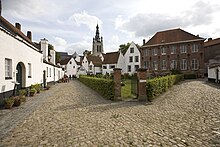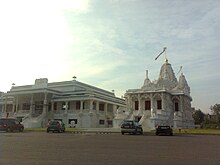Religion in Belgium
Belgium's policy separates the state from the churches, and freedom of religion of the citizens is guaranteed by the country's constitution.According to a 2010 Eurobarometer poll:[2] Some religious people dispute these precise figures, as it is difficult to determine the number of Belgian Christians that believe in a personal deity.What is also unclear is the number of registered Belgian Catholics with deistic beliefs or who periodically attend small Evangelical churches.[16] Until 1998, the Catholic Church annually published key figures such as Sunday mass attendance and the number of baptized children.[21] The Spanish reconquest of the Southern Netherlands in the Eighty Years' War prompted most of the Belgian Protestants to flee to the north or convert, causing the region to again be overwhelmingly Catholic.[16] The Eastern Orthodox Church in Belgium is subdivided into several canonical jurisdictions: Russian, Ecumenical, Serbian, Romanian, and Bulgarian.[29] The majority of Hindus in Belgium originate from Nepal, some come from diamond trading communities in India, and some are native converts, mostly of the ISKON movement.[32] After the Roman period, Christianity was brought back to the southern Low Countries by missionary saints like Willibrord and Amandus.From the Spanish military conquest of 1592 until the re-establishment of religious freedom in 1781 by the Patent of Toleration under Joseph II of Austria, Catholicism was the only religion allowed, on penalty of death, in the territories now forming Belgium.[33] Religion was one of the differences between the almost solidly Catholic south and the predominantly Protestant north of the United Kingdom of the Netherlands, formed in 1815.In Belgium's first century, Catholicism was such a binding factor socially that it prevailed over the language divide (Dutch versus French).The decline in religion's importance as a social marker across late-20th-century Western Europe explains to a large extent the current centrifugal forces in Belgium, with language differences (increasingly reinforced by a positive feedback effect in the media) no longer being kept in check by a religious binding factor.Another important controversy happened in 1990, when the Catholic monarch, King Baudouin I, refused to ratify an abortion bill that had been approved by Parliament.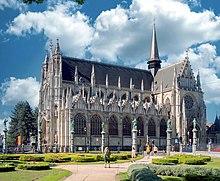
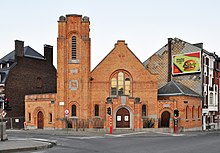


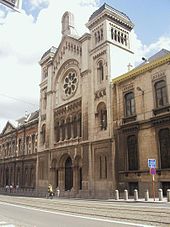
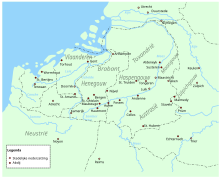
CatholicismProtestantismEastern OrthodoxyChristiansNo religionBuddhismReligion by countryAfricaAlgeriaAngolaBotswanaBurkina FasoBurundiCameroonCape VerdeCentral African RepublicComorosDemocratic Republic of the CongoRepublic of the CongoDjiboutiEquatorial GuineaEritreaEswatiniEthiopiaGambiaGuineaGuinea-BissauIvory CoastLesothoLiberiaMadagascarMalawiMauritaniaMauritiusMoroccoMozambiqueNamibiaNigeriaRwandaSão Tomé and PríncipeSenegalSeychellesSierra LeoneSomaliaSouth AfricaSouth SudanTanzaniaTunisiaUgandaZambiaZimbabweAfghanistanArmeniaAzerbaijanBahrainBangladeshBhutanBruneiCambodiaCyprusGeorgiaHong KongIndonesiaIsraelJordanKazakhstanNorth KoreaSouth KoreaKuwaitKyrgyzstanLebanonMalaysiaMaldivesMongoliaMyanmarPakistanPalestinePhilippinesSaudi ArabiaSingaporeSri LankaTaiwanTajikistanThailandTimor-LesteTurkeyTurkmenistanUnited Arab EmiratesUzbekistanVietnamEuropeAlbaniaAndorraAustriaBelarusBosnia and HerzegovinaBulgariaCroatiaCzechiaDenmarkEstoniaFinlandFranceGermanyGreeceHungaryIcelandIrelandKosovoLatviaLiechtensteinLithuaniaLuxembourgMoldovaMonacoMontenegroNetherlandsNorth MacedoniaNorwayPolandPortugalRomaniaRussiaSan MarinoSerbiaSlovakia

